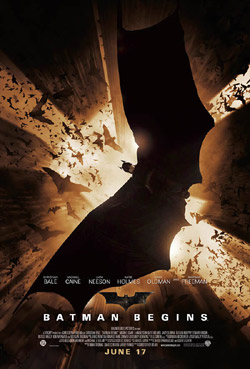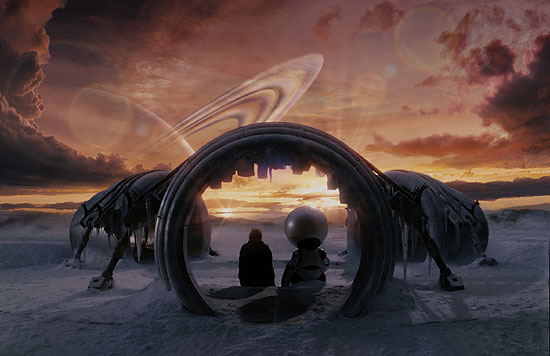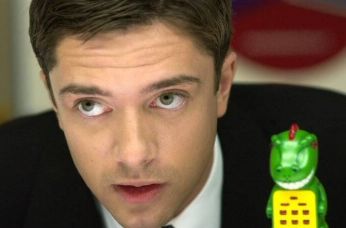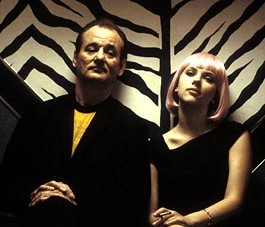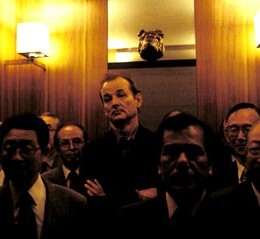Well, it’s that time of year again, New Year’s Eve. So, without further ado…
Top 20 Films of 2003:
[2000/2001/2002]
1. Lord of the Rings: Return of the King. If you didn’t see this pick coming, welcome to
GitM. Ever since this blog started four years ago, I and it have been breathlessly awaiting Peter Jackson’s trilogy, and, boy, he delivered in spades. Even in spite of the pacing problems mandated by the TE running time,
Return of the King is a marvel, the perfect ending to this epic for the ages and easily the best third-movie in a series ever. There’s so many ways these films could’ve turned out atrociously. (To take just three examples, think Brett Ratner doing the Pullman books, or the Wachowskis faltering on the early promise of
The Matrix, or how Chris Columbus has made the magical world of Harry Potter so four-color monotonous.) The fact that they didn’t — that they instead shattered all expectations while staying true to Tolkien’s vision — is a miracle of inestimable value. In the post-
Star Wars age, when epics have been replaced by “blockbusters,” and most event movies have been hollowed-out in advance by irony, excessive hype, dumbing-down, and sheer avarice, Peter Jackson has taught us to expect more from the cinema once again. Beyond all imagining, he took the ring all the way to Mordor and destroyed that sucker. So have fun on
Kong, PJ, you’ve earned it.
2. Lost in Translation. It was fun for a while, there was no way of knowing. Like a dream in the night, who can say where we’re going? I still think Sofia Coppola cut a little close to the bone here in terms of autobiography, particularly given her recent split with Spike Jonze. Still, I find this tale of chance encounters and foreign vistas has a strange kind of magic to it, and it has stayed with me longer than any other film this year. Bill Murray comes into full bloom in a part he’s been circling around his entire career, and while I suspect he’ll get some stiff competition from the Mystic River boys come award-time, I’d say he deserves the Oscar for this one. Lost in Translation has its problems, sure, but at it’s best it’s haunting, ethereal, and touching like no other film in 2003.
3. Intolerable Cruelty. I expect I’ll be in the minority on this pick – This more-mainstream-than-usual Coen joint only got above-average reviews, and hardly anyone I’ve spoken to enjoyed it as much as I did. Still, I thought Intolerable Cruelty was a pop delight, 99.44% pure Coen confection. George Clooney is used to much better effect here than in O Brother (gotta love the teeth thing), and everyone else seems to be having enormous amounts of fun along the way. Light and breezy, yeah, but I thought it was that rare breed of romantic comedy that actually manages to be both romantic and hilarious. In the post-Tolkien era, it’s good to know we can always rely on the Coens for consistently excellent work, and I for one am greatly looking forward to The Ladykillers.
(3. The Pianist.) A 2002 film that I caught in March of this year, The Pianist is a harrowing and unique survivor’s tale that’s hard to watch and harder to forget (and I can’t have been the only person who thought post-spider-hole Saddam bore a passing resemblance to Brody’s third-act Szpilman.) Speaking of which, I said in my original review of Adrien Brody that “I can’t see the Academy rewarding this kind of understatement over a scenery-chewing performance like that of Daniel Day-Lewis in Gangs of New York.” Glad to see I was wrong.
4. Mystic River.: The waters of the Charles are disturbed, something is rotten in the outskirts of Boston, and it’s safe to say the Fates are wicked pissed. Much like In the Bedroom in 2001 (and Clint Eastwood’s own earlier Unforgiven), Mystic River is inhabited and propelled by a spirit of lumbering, impending, inexorable doom…what Legolas might call a “sleepless malice.” It is that existential malice, rooted so strongly in local color, that gives this River its considerable power. And unlike Cold Mountain, where stars stick out here and there with showy turns, the ensemble cast of Mystic River never overwhelm the strong sense of place at the heart of the film — indeed, they sustain it with consistently excellent and nuanced performances. Big ups for all involved, and particularly Tim Robbins and Marcia Gay Harden.
5. X2: X-Men United. Laugh if you want, but I can’t think of any other movie where I had more fun this year. Arguably the most successful comic film since Superman 2, X2 improved over its rather staid predecessor in every way you can imagine. From Nightcrawler in the White House to the assault on the mansion to Magneto’s escape to Ian McKellen and Brian Cox chewing the scenery in inimitable fashion, X2 was ripe with moments that seemed plucked directly out of the comics, if not straight out of the fanboy id. To me, my X-Men.
6. Master and Commander: The Far Side of the World. It’s a long title, it’s a long movie. But a good kinda long…in fact, as I said in my initial review, it seemed to move to the langorous rhythms of a long sea voyage, one that I may not take again for awhile, but one that I still thoroughly enjoyed. And I’ll say this for Russell Crowe…somewhere along the way in each of his films, I tend to forget that he’s Russell Crowe. His Capt. Jack Aubrey was no exception.
7. The Matrix Reloaded. If we can, let’s try to forget the resounding thud on which the Matrix trilogy ended. For a time there, five short months, the fanboy nation was abuzz in trying to figure out exactly where the Wachowskis were going after the second chapter. Previous Matrices, previous Ones? How was Neo manipulating the real world? What was Smith up to? It all seems kinda pedestrian now, of course, but at the time Reloaded was a sequel that outdid its predecessor in pizazz while building on the questions that animated the first film. I won’t defend the first forty-five minutes or the ridiculous rave scene. But, right about the time Hugo Weaving showed up to do what he does best, Revolutions found a new gear that it maintained right up until the arc-twisting Architect monologues at the end. And, as far as action sequences go, it’s hard to beat the visceral thrill of the 14-minute highway chase.
(7. The 25th Hour.) Another 2002 hold-over, and the best film yet made about the aftermath of 9/11, (which only seems natural, given that it’s by one of New York’s finest directors.) Haunted by might-have-beens, what-ifs, and what-nows, The 25th Hour feels real and immediate in its attempt to grapple with both 9/11 and the slamming cage in Monty Brogan’s future. Only once, with the Fight Club-like fracas in the park, does the film flounder. Otherwise, it’s a thought-provoking meditation throughout.
8. The Last Samurai: Breathtaking New Zealand landscapes, furious suicide cavalry charges, rustic untainted pre-modern villages…no, it’s not Return of the King, just the warm-up. [And, as I said earlier, I prefer my anti-modern nostalgia hobbit-like (peaceful, environmental, epicurean) rather than samurai-ish (martial, virtuous, stoic)] While I think Cold Mountain got the Civil War right, I ultimately found this film to be the more engaging historical epic of December 2003. So take that, Miramax.
9. Finding Nemo. Oh, my…I almost forgot about Nemo. (Just like Dory sometimes.) Pixar’s films have been so consistently good that there’s a danger of taking them for granted. They hit another one out of the park in this tale under the sea. As with the Toy Stories and Monster’s Inc. before it, just an all-around solid kid’s movie filled to the brim with eye-popping wonders.
10. Dirty Pretty Things. Although it becomes more conventional as it goes along, DPT starts very well, features a star-making turn by Chiwetel Ejiofor, and manages to include a Audrey Tautou performance that isn’t fingernails-on-the-blackboard bothersome. As with Hugh Grant in About a Boy last year, that deserves plaudits if nothing else.
11. L’Auberge Espagnole. Hmm…two Tautous in a row….perhaps I should stop playa-hatin’. At any rate, while Lost in Translation trafficked in existential detachment, L’Auberge Espagnole showed the fun Scarlett Johannson could’ve been having, if she’d just lighten up and get out of the hotel once in awhile. This paean to the pan-Continental culture of the EU captured the excitement and possibilities of youth in a way that was both sexier and funnier than any of the teen shock-schlock emanating from our own side of the pond. Road Trippers, take a gander.
12. The Quiet American. A bit by-the-numbers, perhaps, but Phillip Noyce’s take on Graham Greene’s novel was blessed with timeliness and two great performances by Michael Caine and Brendan Fraser, both of whom expertly exemplified their homelands’ diplomatic tendencies without becoming overly tendentious. I’m not sure if giving away the end before the credits was the right way to go, but otherwise the film rarely falters.
13. The Fog of War. From Alden Pyle to one of his real-life counterparts, Robert McNamara, who now only remains quiet when questioned about his own culpability over Vietnam. Despite this central failing, a spry McNamara succeeds in penetrating the fog of time to examine how he himself became lost in the maze-like logic of war. If you can withstand the frequent Phillip Glass-scored barrages, it’s worth a see.
14. Pirates of the Caribbean. My initial upbeat opinion on this one has faded somewhat over the autumn and winter months. Still, at the time PotC was a surprisingly good summer popcorn flick, and rollicking fun for about two of of its two and a half hours. Johnny Depp and Geoffrey Rush were great fun, Keira Knightley and Orlando Bloom make for great eye candy, and Sam Lowry was in it. I’m just going to assume it was much, much better than The Haunted Mansion.
15. The Station Agent. Ok, it’s got Sunday afternoon bored in front of the IFC Channel written all over it. And not much happens for the last forty minutes or so. Still, The Station Agent proves that if you write a few interesting, well-rounded, complicated characters and throw them in a situation together, the story almost writes itself.
16. American Splendor. The first of a couple of movies that I seemed to like less than most people. Sure, I thought Splendor was well-done, but it never really grabbed me, and I’d be more impressed by its breaking-the-fourth-wall daring if it hadn’t already been done twenty-five years ago in Annie Hall. (Similarly, I thought this kooky underground comic world was captured better in Crumb.)
17. Spellbound. Could you use it in a sentence? Again, people seemed to love this flick, and I was definitely entertained by it. But, when you get right down to it, what we have here is kids spelling for two hours…I couldn’t imagine ever sitting through this one again. And, as I said in my original post, I thought Spellbound was more manipulative than it lets on. Less kids and more complexity would’ve made the film more satisfying. S-A-T-I…
18. Cold Mountain. I’ve already written about this one at length today, so I’ll just refer you to the review. To sum up, occasionally beautiful but curiously uninvolving and way too top-heavy with star power distractions.
19. 28 Days Later. Great first third, ok second third, lousy finish. The film was much more interesting before our team makes it to Christopher Eccleston’s countryside version of Apocalypse Now. And I can’t stand horror movies where the protagonists make idiot decisions, like driving into tunnels for no reason or taking downers when surrounded by flesh-eating, spastic zombies. But the cast — particularly Brendan Gleeson — do yeoman’s work, and the opening moments in an empty London are legitimately creepy.
20. T3: Rise of the Machines. Before he was the Governator, he was the T-1000 one (last?) time. Let’s face it, this movie is mainly here by virtue of not being bad. I mean, c’mon, it was better than you thought, right? Well, me too. Claire Danes was insufferable, but Nick Stahl and Kristanna Loken give it the ole college try, and the story takes a few jags that weren’t immediately apparent. Bully to Jonathan Mostow for not running James Cameron’s franchise into the ground.
As Yet Unseen: 21 Grams, Bad Santa, The Cooler, House of Sand and Fog, In America, Love, Actually, Something’s Gotta Give.
Best Actor: Bill Murray, Lost in Translation. Sean Penn, Mystic River. Chiwetel Ejiofor, Dirty Pretty Things. Michael Caine, The Quiet American.
Best Actress: Scarlett Johannson, Lost in Translation (who’s sort of here by default…I expect competition from Diane “Something’s Gotta Give” Keaton, Samantha “In America” Morton, Jennifer “House of Sand and Fog” Connolly, and Naomi “21 Grams” Watts.)
Best Supporting Actor: Tim Robbins, Mystic River, Sean Astin, Return of the King, Billy Boyd, Return of the King, Ken Watanabe, The Last Samurai.
Best Supporting Actress: Renee Zellweger, Cold Mountain, Marcia Gay Harden, Mystic River, Patricia Clarkson, The Station Agent.
Worst Films: 1. Gods and Generals, 2. Dreamcatcher, 3. Scary Movie 3. 4. Underworld.
Worst Disappointments: 1. The Hulk, 2. The Matrix: Revolutions, 3. Kill Bill, Vol. 1.
Ho-Hum: 1. LXG, 2. Bubba Ho-Tep, 3. Big Fish, 4. Masked and Anonymous. 5. Tears of the Sun. 6. Veronica Guerin, 7. The Core.
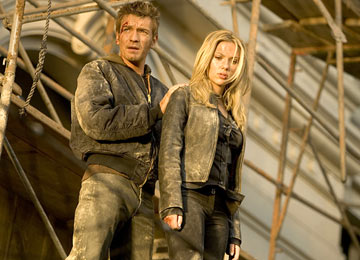 So, after a paltry $12 million its opening weekend, it’s looking like Michael Bay’s The Island has turned out to be an outright box-office flop. Which is too bad, really, ’cause I caught it on Saturday and thought it was a solid summer movie actioner, with a soupcon of dystopian sci-fi gravitas. In fact, I’d say it’s probably Bay’s best film (which isn’t saying much, of course, but I’ll take it over The Rock, Armageddon, Pearl Harbor and the Bad Boys.)
So, after a paltry $12 million its opening weekend, it’s looking like Michael Bay’s The Island has turned out to be an outright box-office flop. Which is too bad, really, ’cause I caught it on Saturday and thought it was a solid summer movie actioner, with a soupcon of dystopian sci-fi gravitas. In fact, I’d say it’s probably Bay’s best film (which isn’t saying much, of course, but I’ll take it over The Rock, Armageddon, Pearl Harbor and the Bad Boys.)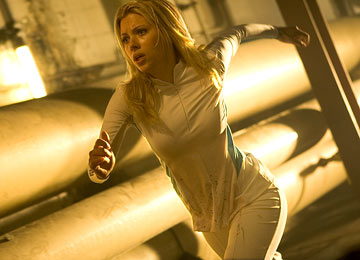 At which point, the chase begins and, well, you can guess the rest. Lincoln and Jordan spend the second half of the movie rushing frantically from the minions of a resolute and unstoppable bounty hunter (Djimon Hounsou — We know he’s a badass because Bay always shoots him from about knee level.) Higher order brain functions are no longer necessary for the remainder of the film, although there’s a nice stopover at the abode of Lincoln’s “sponsor” (and a rather impressive highway chase involving car-crushing dumbbells.) Still, in the end, The Island is redeemed from normal Bay-dom by a better-than-average script and several solid performances, with special nods to Ewan and Michael Clarke Duncan in an extended cameo. (Voyager‘s Neelix and the guy from the Manhattan Mini-Storage moose ad also live in the complex, which I found a bit distracting.) It’s not a great film by any means – In fact, it’s almost instantly forgettable. But The Island is a nice place to wile away two hours on a hot summer afternoon (and in a perfect world it’d do twice the business of FF.)
At which point, the chase begins and, well, you can guess the rest. Lincoln and Jordan spend the second half of the movie rushing frantically from the minions of a resolute and unstoppable bounty hunter (Djimon Hounsou — We know he’s a badass because Bay always shoots him from about knee level.) Higher order brain functions are no longer necessary for the remainder of the film, although there’s a nice stopover at the abode of Lincoln’s “sponsor” (and a rather impressive highway chase involving car-crushing dumbbells.) Still, in the end, The Island is redeemed from normal Bay-dom by a better-than-average script and several solid performances, with special nods to Ewan and Michael Clarke Duncan in an extended cameo. (Voyager‘s Neelix and the guy from the Manhattan Mini-Storage moose ad also live in the complex, which I found a bit distracting.) It’s not a great film by any means – In fact, it’s almost instantly forgettable. But The Island is a nice place to wile away two hours on a hot summer afternoon (and in a perfect world it’d do twice the business of FF.)
